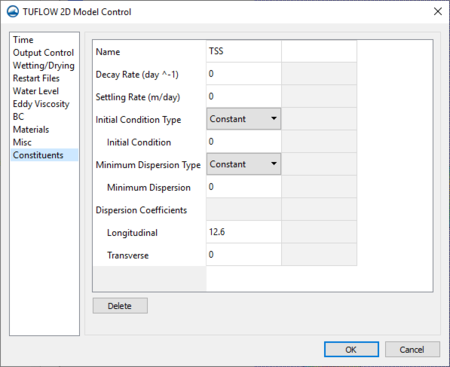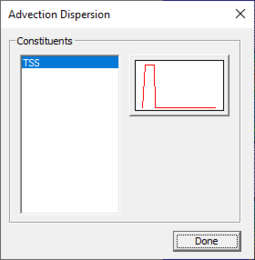SMS:TUFLOW AD: Difference between revisions
No edit summary |
|||
| (14 intermediate revisions by the same user not shown) | |||
| Line 1: | Line 1: | ||
[[Image:TUFLOW AD. | [[Image:TUFLOW AD.png|thumb|450 px|TUFLOW ''Model Control'' dialog showing the ''Constituents'' tab.]] | ||
SMS supports the TUFLOW Advection Dispersion (AD) module. This allows modeling constituents using TUFLOW. | SMS supports the TUFLOW Advection Dispersion (AD) module. This allows modeling constituents using TUFLOW. | ||
| Line 7: | Line 7: | ||
==Creating the Constituents== | ==Creating the Constituents== | ||
The constituent data is entered in the ''Model Control'' of the TUFLOW simulation. The ''Constituents'' tab allows entering in the following parameters for each constituent: | The constituent data is entered in the ''TUFLOW 2D Model Control'' of the TUFLOW simulation. The ''Constituents'' tab allows entering in the following parameters for each constituent: | ||
* ''Name'' – | * ''Name'' – Enter the name for the constituent here. | ||
* ''Decay rate (units of day^-1)'' | * ''Decay rate (units of day^-1)'' – The decay rate of the constituent in units of day-1. This value is used in a first order decay calculations at each time step, i.e. Enter zero or blank if no decay is required. | ||
* ''Settling rate (units of m/day)'' | * ''Settling rate (units of m/day)'' – The settling rate of the constituent in units of m.day-1. This value is used in a simple mass balance calculation that removes the constituent from the water column based on this rate. Enter 0 or leave blank if no settling is required. | ||
* ''Initial Condition Type'' | * ''Initial Condition Type'' – Specified for each constituent as either a constant value or spatially variant. Select either "Constant" to enter a constant value or "Coverage" to select a [[SMS:TUFLOW_Coverages#2D_Miscellaneous_Coverage|spatial attributes (Miscellaneous) coverage]]. | ||
** ''Initial Condition'' – Specify a constant value or '''Select''' option to open a ''Select Coverage'' dialog to specify a spacial attributes coverage polygon. | |||
* ''Initial Condition'' – | * ''Minimum Dispersion Type'' – Specified for each constituent as either a constant value or spatially variant. Select either "Constant" to enter a constant value or "Coverage" to select a [[SMS:TUFLOW_Coverages#2D_Miscellaneous_Coverage|Spatial Attributes (Miscellaneous) coverage]]. | ||
** ''Minimum Dispersion'' – Specify a constant value or '''Select''' option to open a ''Select Coverage'' dialog to specify a spacial attributes coverage polygon. | |||
* ''Minimum Dispersion Type'' | *''Dispersion Coefficient'' – Allows variation between constituents to permit simultaneous simulation of multiple constituents with varying dispersion properties. | ||
** ''Longitudinal'' – Direction parallel to flow. | |||
* ''Minimum Dispersion'' – | ** ''Transverse '' – Direction perpendicular to flow. | ||
*''Dispersion Coefficient'' | |||
* ''Longitudinal'' | |||
* ''Transverse '' | |||
==Boundary Conditions== | ==Boundary Conditions== | ||
| Line 42: | Line 36: | ||
[[Category:TUFLOW|A]] | [[Category:TUFLOW|A]] | ||
[[Category:TUFLOW Dialogs]] | [[Category:TUFLOW Dialogs|AD]] | ||
[[Category:SMS Model Control|T]] | [[Category:SMS Model Control|T]] | ||
[[Category:External Links]] | [[Category:External Links]] | ||
Latest revision as of 16:59, 12 August 2019
SMS supports the TUFLOW Advection Dispersion (AD) module. This allows modeling constituents using TUFLOW.
The TUFLOW AD module can be added to a paid edition of SMS.
Creating the Constituents
The constituent data is entered in the TUFLOW 2D Model Control of the TUFLOW simulation. The Constituents tab allows entering in the following parameters for each constituent:
- Name – Enter the name for the constituent here.
- Decay rate (units of day^-1) – The decay rate of the constituent in units of day-1. This value is used in a first order decay calculations at each time step, i.e. Enter zero or blank if no decay is required.
- Settling rate (units of m/day) – The settling rate of the constituent in units of m.day-1. This value is used in a simple mass balance calculation that removes the constituent from the water column based on this rate. Enter 0 or leave blank if no settling is required.
- Initial Condition Type – Specified for each constituent as either a constant value or spatially variant. Select either "Constant" to enter a constant value or "Coverage" to select a spatial attributes (Miscellaneous) coverage.
- Initial Condition – Specify a constant value or Select option to open a Select Coverage dialog to specify a spacial attributes coverage polygon.
- Minimum Dispersion Type – Specified for each constituent as either a constant value or spatially variant. Select either "Constant" to enter a constant value or "Coverage" to select a Spatial Attributes (Miscellaneous) coverage.
- Minimum Dispersion – Specify a constant value or Select option to open a Select Coverage dialog to specify a spacial attributes coverage polygon.
- Dispersion Coefficient – Allows variation between constituents to permit simultaneous simulation of multiple constituents with varying dispersion properties.
- Longitudinal – Direction parallel to flow.
- Transverse – Direction perpendicular to flow.
Boundary Conditions
For each boundary condition and constituent, provide a curve representing concentration at the boundary. This can be done by selecting the Advection Dispersion BC... button in the Properties dialog for the arc or polygon. This brings up the Advection Dispersion dialog. In the dialog, select a constituent from the list provide. The list is generated from constituents in the Constituents tab of the TUFLOW 2D Model Control dialog.
Clicking the curve button to the right will bring up an XY Series Editor dialog where the curve information can be entered.
External Links
Related Topics
SMS – Surface-water Modeling System | ||
|---|---|---|
| Modules: | 1D Grid • Cartesian Grid • Curvilinear Grid • GIS • Map • Mesh • Particle • Quadtree • Raster • Scatter • UGrid |  |
| General Models: | 3D Structure • FVCOM • Generic • PTM | |
| Coastal Models: | ADCIRC • BOUSS-2D • CGWAVE • CMS-Flow • CMS-Wave • GenCade • STWAVE • WAM | |
| Riverine/Estuarine Models: | AdH • HEC-RAS • HYDRO AS-2D • RMA2 • RMA4 • SRH-2D • TUFLOW • TUFLOW FV | |
| Aquaveo • SMS Tutorials • SMS Workflows | ||

